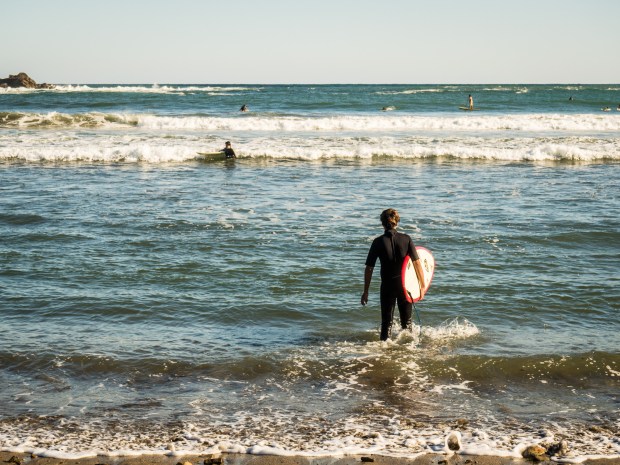This should be a pleasant day, walking alongside the Pacific Ocean, listening to the unusually gentle waves. But two things weigh heavily on my walks and thoughts.
Physically, my legs are taking a beating. I started the trip having just recovered from a right hamstring injury. That problem faded only to be replaced by increasingly sore thigh muscles. A dull pain accompanies each step. I can think of two causes.
First, there was the strenuous climbing of earlier days. My flatlander limbs were tested in new and novel ways on those near-vertical treks. It took a good two days to recover.
Second, my pack seems excessively heavy and I am feeling its pressure on my legs. We came to Japan packed for all eventualities. That included sleeping bags and mattresses just in case lodging was unavailable and we needed wayside rest stops en route. However, finding lodging has not been a problem at all. And the the wayside stops we have seen do not look that appealing.
My pack weighs heavily on my mind too. With each step, I am ever more conscious of its burden. Gail, on the other hand, is not complaining. She seems to skip along with no pain and has no issues with her pack, which is proportionately just as heavy as mine. We try to keep our packs to 10% of our body weights.
As we walk, I daydream of a featherweight load on my back and of happily skipping down the road. Today is the tipping point.
In the small coastal town of Kaifu, we take a rest and I propose to Gail that we unload our unneeded baggage and ship it back to Canada. We agree to stop at the next post office we come across and see what we can do.
That town is Shishikui. In its clean, modern post office, we park ourselves on a bench. The staff, in typical Japanese fashion, are exceptionally helpful and patient as we work out the details in our mutually-exclusive languages. We spill out clothing and other travellers’ bric-a-brac across the polished floor, sorting it all and filling a large shipping box with our excessive load. We consider ourselves seasoned travellers, used to carrying all we require for a trip on our backs. Today, we feel embarrassed at how we missed the mark.
We bid goodbye to our box of trimmings – due for delivery in Winnipeg two months on – and say hello to a new, near-floating quality to our walk. There is immediate psychological relief from a greatly reduced load bearing down on my legs.
But the second more worrisome burden remains. Two days earlier, my sister had sent me an email. Our Mum back in Winnipeg had suffered a stroke. Just two weeks ago, she and I were sharing good times on excursions around town and our home province. We visited horse stables, historic buildings, coffee shops, museums. We ate pickerel on the beach in Gimli and visited the distant town of Treherne, her childhood home. Places that reduce some of the mentally debilitating weight she carries – confinement to a wheelchair and a seniors’ home – and leaving it boxed for a few hours while she lightly floats away. When I said goodbye to Mum just two weeks ago, it was with the tacit understanding we would resume our adventures when I returned from Japan.
My sister’s news was a shock. She and my brother, who live in Vancouver and Toronto respectively, were flying to Winnipeg to be with Mum. It was still too early to tell whether, or how well, she might recover. Or whether our trip will be cut short. So we continue on our pilgrimage, the physical burden lightened, the mental burden heightened.
The seas are calm today under the intense sun. Our route takes us along sandy beaches and through quaint fishing villages, eventually reaching our oddly named destination, Ikumi Surfin Beach. No, that is not a misspelling. But it is appropriate, given the laid-back nature of the hamlet, with its temporary population of youthful surfers speaking assorted languages from around the world.
Minshuku Ikumi is a funky place brimming with young surfers and older pilgrims. Outside, VW vans and other surf-ready jeeps line the street while surfers tend to their boards, washing them down, preparing them for the next day. Our host, a wirey guy with a slightly bohemian look and feel, fits the mould of the place to a tee. He’s a former surfer, Japanese but worldly and with a good command of English. Our day ends comfortably in his cozy dining room brimming with memorabilia of the surfing life.
“Take water and food” our host warns as we prepare to leave the next morning. Apparently Highway 55 becomes ever more desolate as we head south to Cape Muroto. There are no restaurants or grocery stores once we leave town. Any vending machines encountered might be empty. Our wary band of pilgrims take his words to heart, invading the lone, tiny grocery store on our way out of town, emptying shelves of chips and drinks. Luckily, we scoop up the last two onigiri, snacks of rice wrapped in seaweed.
As promised, it is a lonely road. But not desolate at all. There is a fierce beauty of steep cliffs on one side, endless seas on the other and a blazing sun above. A simple, endless elegance. We glide along with our remarkably lighter packs. My legs seem less stressed, as do I. Even the vending machines cooperate, coughing out cool coffees without the expected complaints.
That calm, reflective morning walk along Highway 55 will end with a more dire text message from my sister.
Our pilgrimage is about to end. But there was one last devotional task to perform. That story is found on an earlier blog post, Shikoku: A Tribute to Mum.


















